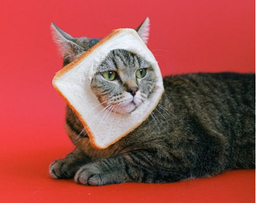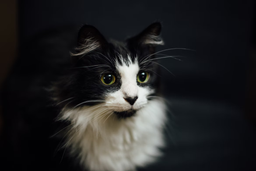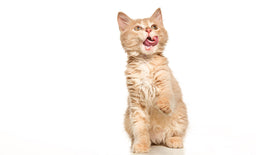Close, but no coconut oil for cats
Among the latest fads in cat nutrition, coconut oil is gaining the most popularity.
Proponents believe it’s a miracle cure for anything from skin problems to gastrointestinal issues and advocate feeding it as a supplement or complementary food. Regardless of your choice of cat food (wet, semi-moist, dry, or raw), coconut oil is said to be the perfect way to give your feline a more healthy diet.
Miracle cures are seldom all they are cracked up to be. Whereas coconut oil may have some beneficial effects on cats, using it as part of your feline’s diet isn’t risk-free.
Untamed examines the facts around coconut oil for cats—what the risks are, what it can help with, and whether you should use it to tailor-make the perfect meal plan for your kitty.

“You’re sure this is good for me?”
Source: Pixabay
Are cats and coconut oil a good combination?
Coconut oil is a vegetable product rich in saturated fats and calories.
The coconut oil craze in feline nutrition comes from an ongoing trend in human dietary supplements and skincare industries, which embraced this product with open arms.
In the world of human consumer goods, coconut oil is touted as a hair tonic, skincare product, and healthier alternative to common cooking and dressing oils.
While coconut oil may benefit humans, cats’ natural dietary needs are significantly different.
Cats are obligate carnivores, so their nutritional requirements are best met by animal products, specifically:
- Animal protein
- Animal fat
Animal protein vs. plant (coconut) protein
Protein is made up of amino acids—the building blocks of:
- Muscle
- Skin and coat
- Organs
Cats need the right combination of amino acids—most notably taurine and arginine—in their diet. The best source of these micronutrients is meat.
Animal protein varies in quality, but the lowest-value meats are still significantly better protein sources for cats than the best vegetable proteins.
Protein quality is measured by its biological value (BV), indicating what percentage of the protein a cat can metabolise. The BVs of the most common protein sources for cats are as follows:
|
Protein source |
Biological value |
|
98% |
|
|
94% |
|
92% |
|
87% |
|
|
68% |
|
Below 65% |
Coconut contains specific proteins that may be healthy for humans and other herbivores and omnivores, but your cat won’t be able to break them down and absorb essential amino acids. It is safer to stick to a high-protein diet based on whole meat than to experiment with feline veganism.
Animal fat vs. coconut oil
As well as being a viable energy source, animal fat also provides essential fatty acids and significantly improves the taste of cat food.
While coconut oil is a good source of calories, it doesn’t necessarily tickle felines’ taste buds, so you would have to add it surreptitiously to their food.
Coconut oil is also rich in saturated fat, linked to obesity and pancreatitis in cats.
Animal fat in cat jelly or cat gravy is a considerably healthier source of calories than coconut oil.

“Why does my food taste funny, mummy?”
Source: Pixabay
How is coconut oil good for cats?
Some veterinarians and cat breeders claim that mixing coconut oil with wet or dry cat food has a beneficial effect on:
- Skin and coat
- Feline digestion
- Inflammation throughout the body
- Immune system effectiveness
Skin and coat
Coconut oil fans claim that it can positively impact your cat’s skin and coat health by supplementing the sebum produced to moisturise the skin.
Using coconut oil externally will undoubtedly help:
- Soothe irritated areas
- Reduce inflammation caused by insect bites or food allergies
- Combat fungal diseases, such as ringworm
- Reduce shedding and help manage the frequency of hairballs
Feeding coconut oil to your cat is more contentious. There is little reliable research on potential skin and coat health benefits of supplementing cat food with extra fats—most of the evidence available is anecdotal.
Feline digestion
Coconut oil is rich in caprylic acid—a medium-chain triglyceride with alleged antibacterial properties.
Medium- and short-chain fatty acids can improve gut health in cats, so there may be some truth in the claim that coconut oil can aid the absorption of vitamins and minerals during digestion.
Fatty acids from animal fat can do this even better, so adding whole meat to your cat’s diet is more beneficial because there’s strong evidence to back up this practice. Your kitty meals will also be delicious.
Inflammation throughout the body
As a rich source of antioxidants, coconut oil may help reduce inflammation and alleviate symptoms of ailments, such as:
- Arthritis
- Irritable bowel syndrome (IBS)
- Gingivitis or gum disease
Fatty acids support inflammatory responses in cats, so coconut oil may boost your feline’s ability to combat these conditions. Once again, it is wiser to opt for whole meat because we are sure that cats can metabolise the nutrients from meat efficiently, while the bioavailability of vegetables for felines is iffy.
Immune system effectiveness
Coconut oil is rich in lauric acid, which possesses antifungal and antibacterial properties.
Cat breeders and veterinarians suggest that lauric acid in coconut oil could boost a cat’s immune system.
No scientific research has yet been carried out, but lauric acid is known as an immune booster in human nutrition. The same may be true for cats.
Panacea or snake oil? While many cat experts attest to the benefits of coconut oil, you should also be aware of the potential negative side-effects of using it in your feline’s diet.
Is coconut oil safe for cats?
Using coconut oil as a skin treatment for kittens, adults, and senior felines is perfectly safe, but adding it to their food can involve some risks.
The most important considerations are:
- Gastrointestinal problems
- Weight gain and obesity
- Pancreatitis and diabetes
Gastrointestinal problems
Cats are inveterate individualists, so something that works for one cat may have the opposite effect on the other.
Coconut oil is a risk factor for gastrointestinal problems. Ingesting it may cause your cat to suffer from:
The American Society for the Prevention of Cruelty to Animals (ASPCA) warns explicitly against too much coconut oil in a feline’s diet, listing it under the foods that can be harmful to cats.
While acute tummy troubles usually clear up in a short time, longer-term digestive problems can be a serious issue for felines.
If your cat stops eating due to stomach problems, their body quickly starts to metabolise stored fat reserves. These can flood your feline’s liver, leading to fatty deposits building up around the organ and hindering its function.
If left untreated, rapid weight loss and impaired liver function can be fatal to cats.
You should be particularly careful when feeding coconut oil to:
- Kittens
- Pregnant queens
- Senior cats
Kittens’ digestive systems are not developed enough to cope with coconut oil, and diarrhoea or weight loss can be dangerous during the growth phase.
Pregnant queens need all their energy to help their kittens develop before and after birth. Any gastric problems can have severe consequences for the health of the litter.
Older cats’ digestive tracts start slowing down and become less able to cope with food. Coconut oil may cause gastrointestinal problems with knock-on effects on other organs in senior cats, such as the:
- Kidneys
- Heart
- Urinary tract
Weight gain and obesity
Coconut oil is calorie-rich, so there is a risk of your cat gaining weight if they consume too much.
Many felines—particularly neutered males and indoor cats—lead a sedentary life anyway, and adding fatty food to their diet can make them obese quickly.
If your cat already struggles with extra weight, coconut oil may compound the problem if used as a nutritional supplement.
You should reduce your feline’s calorie intake elsewhere if you insist on adding coconut oil to the diet but be aware that your cat still needs all the essential daily nutrients to remain healthy.
You should consult your vet for advice on managing your cat’s weight while feeding coconut oil.
Pancreatitis and diabetes
Cats are not always the best at balancing their calorie intake and energy released through exercise.
A feline’s natural lifestyle consists of:
- Absorption of calories through eating
- Burning of calories through hunting
- Conservation of energy through resting
A wild cat will usually hunt and eat small prey up to 20 times a day while spending much of the remaining time resting to preserve energy.
Domestic felines tend to get food twice a day, so their natural resting periods are longer while energy-releasing activities are scarce. The result is the archetypal fat cat.
Eating large amounts of food in one or two sittings and being overweight can place an inordinate strain on your cat’s pancreas. Many felines consequently suffer from diabetes and pancreatitis.
Coconut oil may contribute to any pancreas or blood-sugar problems your cat already has.

“I am in shape. Round is a shape.”
Source: Pixabay
What are the alternatives to feeding cats coconut oil?
The alleged beneficial effects of coconut oil can all be achieved with healthy nutrition for your cat.
As obligate carnivores, cats can get all the nutrients they need to stay healthy by eating high-quality, meat-based food.
Supplements, such as coconut oil, are only needed if your cat’s usual kibbles or wet food don’t provide the right balance of:
- Protein
- Fat
- Vitamins
- Minerals
How can you tell if cat food is good?
All the information you need to determine whether your choice of cat food is good for your feline is on the product’s label.
The most important facts about the food your cat eats can be gleaned from the:
- Product description
- Ingredients list
- Guaranteed analysis
Product description
The way your cat food is labelled can tell you how healthy it is.
The regulations on cat food labelling stipulate that particular terms and expressions can only be used if a diet fulfils specific criteria.
The flavour of the product and the main ingredient can be pretty different. It is essential to check the exact wording of the label carefully, as follows:
|
Flavour designation |
Percentage of the named meat in the product |
|
“flavoured with” |
Up to 4% |
|
“with” |
Between 4 and 14% |
|
“rich in” |
More than 14 but less than 26% |
|
“xxx”, such as Untamed Chocka Chicken |
Over 26% |
Ingredients list
The ingredients list on cat food has to name all the ingredients in descending order of their volume in the product.
The first ingredient in cat food should be meat, but many manufacturers try to circumvent the rules with the following (entirely legal) tricks:
|
Common labelling tricks |
Explanation |
|
Ingredient splitting |
If the food contains a long list of grains and cereals directly after the meat source, you should check for duplicated sources, such as:
These are all corn, but splitting them makes each of them smaller than the meat ingredient and keeps meat in the first place |
|
Incomprehensible scientific names |
If you don’t know what an ingredient does, you should steer clear of the products. Common artificial additives in cat food include:
These perform various functions, but all of them are unnecessary in high-quality food |
The more concise the ingredients list, the better the quality of cat food is.
Guaranteed analysis
The guaranteed analysis tells you how much of each nutrient group is in the product.
Food labelling legislation forces manufacturers to list:
- Protein
- Fat
- Carbohydrates
- Moisture
- Any other ingredient claimed as a benefit on the label
The ideal values for cat food are:
|
Nutrient type |
Ideal percentage |
|
Protein |
Over 50% |
|
Fat |
Up to 20% |
|
Carbs/fibre |
Maximum 3% |
The table does not tell the whole story, though. The product can be high in protein, but the ingredients list and the description may reveal that the protein sources are mainly vegetable-based.
You can only get a complete picture of the quality of cat food by comparing all three information sources.
The best cat foods have:
- A high proportion of animal protein
- Adequate fat levels for energy
- Few ingredients, all of which are clearly defined
- No artificial additives

The healthiest protein sources for your cat
Image (c) Untamed
Can Untamed replace the health benefits of coconut oil for cats?
Untamed is the best you can do for your cat’s nutritional needs.
Formulated according to cats’ natural requirements, Untamed delivers all the health benefits your cat may get from coconut oil (and more) without any risks.
We make our food on the following principles:
- Exclusively animal protein sources
- Vet-formulated recipes
- Human-grade ingredients
- Ethical production methods
Exclusively animal protein sources
Untamed diets are grain-free and contain only meat or fish as their protein sources.
Your cat gets all the amino acids required in small, easily-digestible portions, so they don’t have to consume huge amounts to stay healthy and well-toned.
With such high levels of animal protein and a bit of fat, even the fussiest feline will be mad about the taste of Untamed.
Vet-formulated recipes
Designed initially as homemade-style recipes, all Untamed products have been improved according to the advice of vets.
You can rest assured that each tin of Untamed contains exactly what your feline needs, no matter whether you have a British Shorthair, Maine Coon, or a fussy exotic kitty, such as a Siamese or Persian.
With Untamed, you don’t need to worry about supplements, such as cat broth, soup, milk, or coconut oil.
Untamed products are also free from all known allergens and delicious, so your kitty will go wild for each dish!
Human-grade ingredients
All ingredients in Untamed food come from the human food supply chain. We don’t use meat derivatives or unnecessary fillers.
With such high quality in the bowl, is it any wonder that your cat will thrive on Untamed goodness?
Ethical production methods
Untamed is not only good for your cat—it’s also good for the planet.
Our meat and fish are sourced from cruelty-free, dolphin-safe, and sustainable suppliers.
Our packaging is 100% recyclable, and we aim for total carbon-neutrality in our operations.
Get rid of the expensive and dubious supplements for your cat and try Untamed today—you will be amazed at how your cat reacts!
How can you try Untamed?

No need for supplements with Untamed!
Image (c) Untamed
Getting Untamed for your feline is as easy as one, two, three.
All you have to do to get our healthy and delicious cat food delivered to your door is:
- Tell us about your cat
- Pick a meal plan
- Order your trial pack
Once your cat food trial pack lands on your doorstep, you can see which Untamed products get the thumbs-up. We will ensure you never run out with regular monthly meal packs for as long as you need.
The benefits will be evident in no time:
|
Timeline |
The Untamed effect |
|
Week one |
|
|
After two months |
|
|
Within four months |
|
|
For life |
|
Untamed’s quality formulation will also help your cat manage:
- Urinary tract infections, such as cystitis and bladder stones
- Annoying rejection of different food types
- Special needs related to specific life stages, such as pregnancy, lactation, or growth

![Best food for Ragdoll cats in the UK [Broken Down]](http://untamed.com/cdn/shop/articles/featured_best_food_for_ragdoll_cats_uk.jpg?v=1646818249&width=256)

